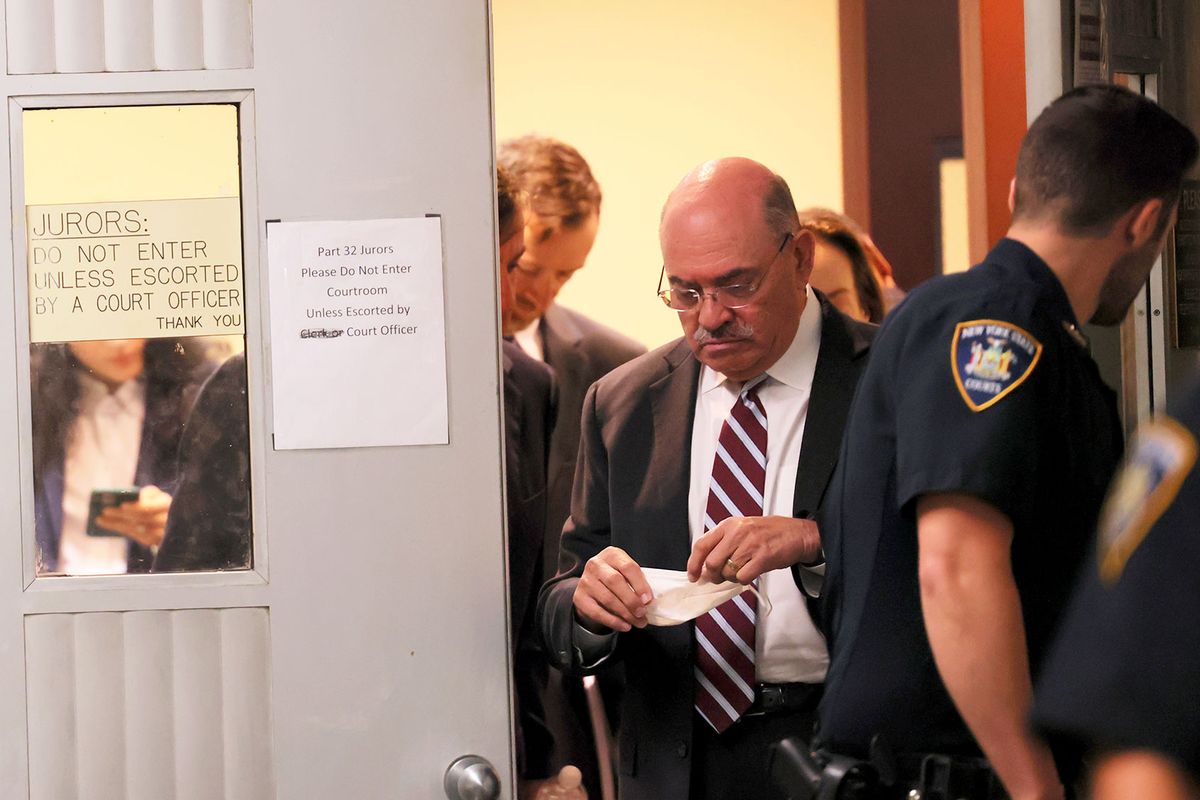After perjury allegation, legal analyst warns Allen Weisselberg risks having his probation “revoked”

Former Trump Organization chief financial officer Allen Weisselberg’s testimony last week came to an abrupt halt mere hours after a Forbes writer accused him of perjury during an earlier appearance on the witness stand as part of former President Donald Trump’s civil fraud trial.
Weisselberg in his testimony claimed that he had “never focused” on the valuation of Trump’s three-floor penthouse in Trump Tower in Manhattan. Trump’s faulty math tagged the property nearly three times greater than its actual square footage.
But Forbes’ senior editor Dan Alexander reported that a slew of emails and reporter notes not currently in the New York attorney general Letitia James’s possession or circulating the public sphere are at odds with Weisselberg’s testimony. “Weisselberg absolutely thought about Trump’s apartment — and played a key role in trying to convince Forbes over the course of several years that it was worth more than it really was,” Alexander wrote. “It defies all logic to think he truly believes what he is now saying in court.” Alexander also deduced that after Weisselberg reportedly misled investigators, he “lied in sworn testimony” last week about his role in that scheme.
Following the report’s release, New York Supreme Court Judge Arthur Engoron held a closed-door meeting with lawyers for both parties, the details of which remain unknown. A source close to James said that her office was probing the Forbes piece.
MSNBC analyst and former litigator Lisa Rubin called the Forbes report “the most important moment” in the second week of James’ ongoing civil fraud trial against the ex-president. But the question remains, she adds: Why did Weisselberg’s testimony come to a standstill?
“One possibility is that Forbes’s perjury accusations necessitated that James take a second look at what he said earlier in the week,” Rubin wrote. “After all, while Weisselberg is not exactly a friendly witness, the attorney general’s office has already relied on Weisselberg to make certain concessions in aid of its case.”
“Losing credibility in the ongoing trial would be the least of his problems,” she continued. “After Weisselberg and the Trump Organization were charged with multiple felonies for a separate tax fraud scheme last year, Weisselberg pleaded guilty to all 15 felony counts against him in exchange for a promise to testify truthfully at the then-upcoming Trump Organization trial.” Weisselberg was ultimately handed a three-month stint at Rikers Island, told to pay $2 million back in taxes, and undergo a five year probation. “And it’s that probation period that could cause him serious problems now,” Rubin writes, given that one of the conditions of his probation is that he “not engage in criminal conduct.”
But in the New York legal system, perjury is considered a crime, as Rubin reminds her readers. “New York Penal Law 210-15, for example, provides ‘a person is guilty of perjury in the first degree when he swears falsely and when his false statement (a) consists of testimony, and (b) is material to the action, proceeding, or matter in which it is made.'”
“Significantly, perjury in the first degree is also a felony punishable by up to seven years,” she added. “But perhaps most importantly, the Manhattan district attorney would not have to undertake a new prosecution of Weisselberg for perjury to move to revoke his probation. It would be enough for the DA’s office simply to convince Judge Juan Merchan that Weisselberg engaged in new, criminal conduct during that period.”
“Of course,” she continued, “doing that would necessitate proof that Weisselberg indeed perjured himself — and that can’t be resolved on the basis of what is known publicly. For one, the emails and notes allegedly in Forbes’ possession underlying its allegations against Weisselberg are not public record. And even assuming Weisselberg did not tell the truth on the stand, it’s also unknown whether such false statements would constitute perjury within the meaning of New York criminal law. New York jury model instructions reflect that in order to prove perjury, prosecutors must show that the defendant ‘intentionally ma[de] a false statement’ only where he did not believe it to be true while giving testimony and had a ‘conscious objective or purpose’ to make a false statement.”
Want a daily wrap-up of all the news and commentary Salon has to offer? Subscribe to our morning newsletter, Crash Course.
“The bottom line is that there are more questions than definitive answers right now,” Rubin wrote. “Did Weisselberg lie on the stand, and if so, did his false testimony constitute perjury, as the Forbes report claims? Could his liberty be at stake? And is the Forbes report in fact the reason or one of the reasons his testimony ended so quickly? I don’t know — but like Trump himself, who is back in the courtroom on Tuesday, I’m watching that case.”
Read more
about the Trump fraud trial

